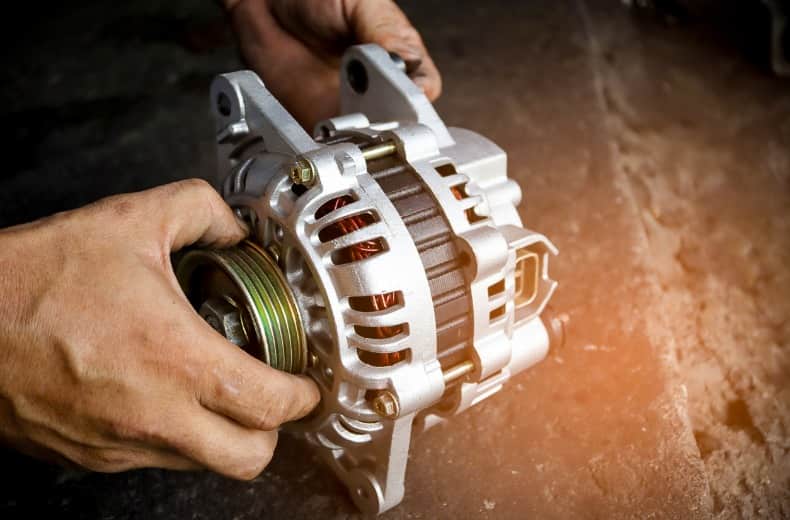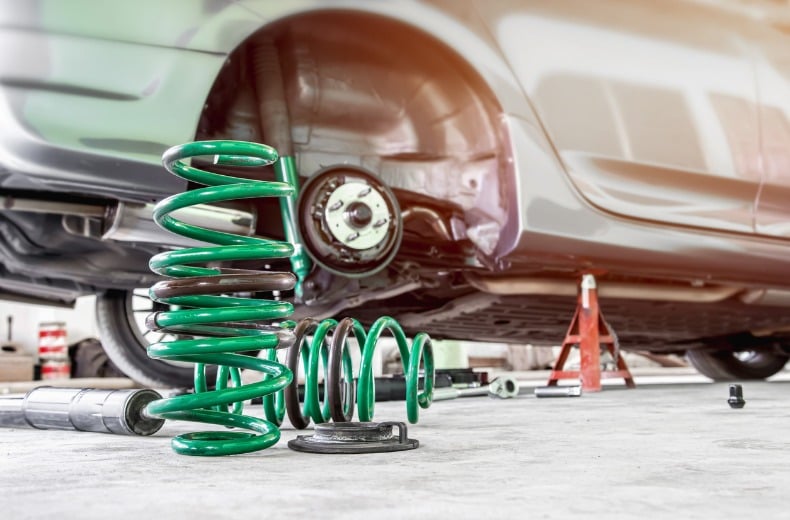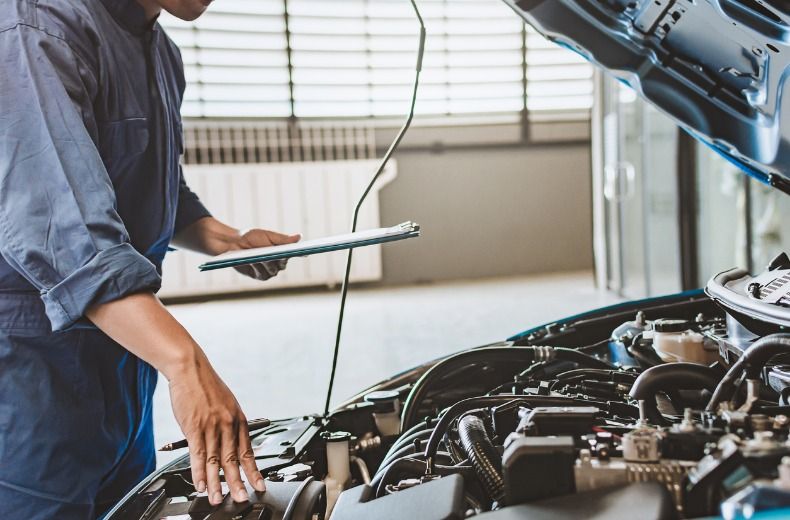Even with an assessment from a professional, it can be difficult to know exactly how much it will cost to fix some of the most common problems cars can suffer from over time.
That’s why, along with our jargon buster, we’ve laid out some of the most expensive car repair jobs that you may have to cough up for to keep your car on the road.
Keep reading to find out what can cause the most costly problems and how to avoid making regular visits to a garage near you.
Catalytic converter replacement
Cost: £2,200 (approx.)
Improving air quality on the roads needn’t cost the earth... well, sort of. Catalytic converters are designed to clean the harmful emissions produced by our exhausts into more environmentally-friendly gases.
You might notice that yours isn’t working properly if your exhaust starts to give off thicker and darker smoke. Alternatively, your engine management light might illuminate on your dashboard. Other signs include:
- Sluggish engine performance
- Reduced acceleration
- The smell of sulphur (or rotten eggs) from the exhaust
- Excessive heat under the vehicle
Often, a replacement rather than a repair job is needed, especially if your catalytic converter has been stolen.
Be warned though, the parts are expensive to replace because they use precious metals. It’s one of the reasons that drivers fit cages to catalytic converters to prevent would-be thieves from removing and selling the parts on.
Your catalytic converter might need to be replaced for other reasons, including:
- A build-up of carbon deposits
- Contamination from oil and coolants
- Overheating due to a misfiring spark plug or leaky exhaust valve
- Physical damage from kerbs, speed bumps and debris on the road
To avoid an expensive catalytic converter replacement, you can ask a trusted garage for an exhaust cleaning service or try taking your car on longer drives on motorways and dual carriageways to build up your speed and let air flow through the system. Using a premium branded fuel will also help.
Clutch
Cost: £1,200 (approx.)
Operated via the pedal on the left for right-hand drive manual cars, the clutch is what allows you to switch between gears as you drive.
You might notice yours isn’t working properly if the left pedal feels spongy, vibrates or sticks when pressed. Sometimes the pedal will give off a squeaking or rumbling noise instead. If not, you might have trouble when changing gear, or find that engine revs rise randomly and performance is reduced.
In simple terms, the clutch can either ‘slip’ or ‘stick’.
When your clutch slips, the clutch plate will move at a different speed to your flywheel – in layman’s terms, the engine will struggle to power your car with the usual amount of force. A sticking clutch occurs when the clutch plate struggles to release the flywheel, this usually presents itself as a grinding noise when changing gear.
Repairing or replacing a clutch is a time-consuming process, even for the professionals. A clutch kit and parts is also costly, and sometimes you may also need to replace the car's flywheel at the same time - adding even more to the cost.
The best way to prevent clutch damage is to have your car regularly serviced. The parts typically last between 60,000 to 100,000 miles but this depends on how and where the car is driven.
Alternator

Cost: £1,140 (approx.)
While car batteries are responsible for starting your engine, it’s actually the alternator that powers your electronics. This part supplies windows, radios and headlights with power and is also responsible for charging your battery while driving.
If your alternator stops working your car will eventually cut out. Fortunately, there are some tell-tale signs that they could be on their way out, including:
- an illuminated battery warning light
- trouble starting or frequent stalling
- dim or flickering lights
- dead battery
- slow electronics
- growling noises
- the smell of burning rubber
Alternators can be an expensive part, mainly because they’re used by so many systems in our cars. Although you won’t save on parts costs by trying to fit an alternator yourself, you may be able to find a refurbished option. However, alternator repairs are one of the services offered by our team of mobile mechanics, who'll come to you when it's convenient.
Unfortunately, there’s not much you can do to prevent them turning faulty. The busy components usually become victims of wear and tear after 50,000 to 100,000 miles of use.
Fuel injector
Cost: £1,060 (approx.)
Fuel injectors deliver petrol or diesel to the engine in a fine mist. Think of them as an electronic valve designed to burn fuel more easily. One of the main reasons the clever piece of kit goes wrong, is when debris find its way into the system. This can happen after filling up on low-grade or contaminated fuels, or after leaving fuel in your car for an extended period of time.
Why is repairing a fuel injector such an expensive job? It’s all down to its precise measurements – and like any intricately-made part they come with a high price tag. Also, each cylinder on your engine will have a fuel injector and it’s recommended to change them all at the same time, so the cost of the bill soon stacks up.
The best way to avoid damaging your fuel injector is to use high-quality fuel from trusted petrol stations. If you don’t plan on using your car for a while, you should either drain the tank and dispose of the waste fuel properly, or use fuel stabiliser. By regularly changing your fuel filters you can also extend an injector’s life span.
5 Star Defaqto rated cover
RAC Comprehensive Car Insurance Plus has been given a 5 Star Rating by Defaqto. Get a quote online today.


Timing belt
Cost: £770
Otherwise known as a cambelt, the timing belt makes sure your camshaft and crankshaft rotate at the right speeds. If the belt snaps, or the rubber teeth become excessively worn, parts can become misaligned. Once this happens, all the parts in your car’s engine will stop working in sync.
A faulty timing belt might cause your engine to misfire, or oil to leak. You’ll also notice that your engine fails to turn over.
Unlike many of the repairs mentioned on this list, fixing a timing belt is often expensive because of the labour costs. You’ll need to ask a trusted garage to dismantle parts of your internal engine, a job that demands a great deal of skill. A trusted RAC garage will be happy to help.
You should change timing belts roughly once every four years or around the 60,000-mile mark. This way, although, you can’t prevent the parts becoming worn, you can avoid any secondary damage to your engine.
Suspension systems

Cost: £312 a pair (approx.)
Suspension systems help us to enjoy a smooth ride and secure handling, but the parts can become damaged by bumps in the road over time. This is especially true if you frequently drive over potholes or speed bumps.
If you want to check your suspension, you should ask yourself:
- Does your car lean to one side when stationary?
- Does your car drift or feel loose around corners?
- Are there any unusual clunks or knocking noises over bumps?
- Does the car continue to bounce after driving over a speed bump?
- Are there signs of uneven wear on your tyres?
One of the quickest ways to test your suspension is to rest all your weight on the bonnet before moving off and paying close attention to how it moves. It’s not difficult to tell if your car feels stiff or if it bounces too much.
Suspension works in pairs split between the front and back tyres. If there’s damage to the components on one side of your car, you’ll usually have to replace the suspension on the other side too. To avoid any imbalances you’ll often have to replace parts on your other wheels. The costs soon add up.
The best way to avoid damaging your suspension is to avoid the worst bumps in the road. By anticipating uneven road surfaces and lowering your speed when mounting kerbs, you can extend the lifespan of your suspension and delay an expensive visit to a trusted mechanic.
Engine cylinders
Cost: Varies widely
Engine cylinders are the power unit of your engine, where pistons move up and down and fuel is burned and converted into mechanical energy.
Over time the seal between cylinders and pistons can become worn. When the seal is no longer airtight, oil can get into the cylinders and lead to parts overheating. If your cylinders are damaged, you might notice:
- lower coolant levels
- oil leaks
- reduced fuel economy
- less power generated by your engine
- more smoke leaving your exhaust
- An engine that sounds and feels rough
Engine cylinders are expensive to repair because they’re at the heart of making your car move. Without them, your vehicle is pretty useless.
The best way to prevent engine cylinders from becoming damaged is to look out for early signs of a loss in power, smoke from the exhaust or increased oil consumption. Beyond that, making sure your car service schedule is followed will help to reduce the likelihood of any engine issues, and mechanics will usually be able to spot any potential looming problems before a big bill.
Transmission
A car’s transmission, or gearbox, converts combustion power to drive the wheels. It experiences more wear and tear than most parts of your vehicle because of its many moving parts.
Some of the warning signs that there’s a problem with your transmission include:
- engine management warning light
- slipping or difficulty when shifting gears
- unusual humming or clunking noises
- red fluid leaking in the middle or front of your car
- a grinding or shaking sensation
- a burning smell
Fortunately, there are a few simple things drivers can do to prevent damaging their transmission. From using the right gear at the right time, to avoiding the temptation to rest your foot on the clutch, or your hand on the gearstick, all of these small measures can help to keep your gearbox in the best possible condition.
Gearboxes also contain oil to help lubricate the vital components within. Often this oil becomes thin or contaminated over time, so replacing it can improve the lifespan of your gearbox whether it's an automatic or manual.

SALE – up to 40% off*
Roadside & Recovery from £5.29 a month*
• Cheaper than AA Price Promise or we’ll beat by 20%^
• We get to most breakdowns in 60 mins or less
• Our patrols fix 4/5 breakdowns on the spot











